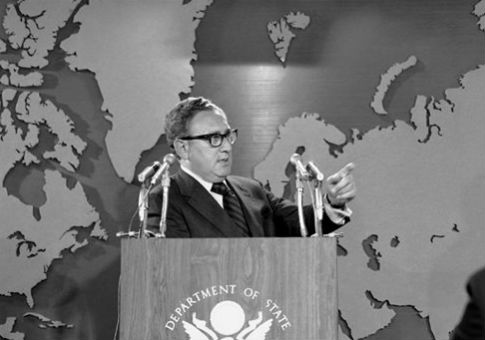In 1973, Walter Laqueur wrote in Commentary that the influence of Henry Kissinger's writings had led to a situation where no article on foreign policy seemed complete "without a quotation or two about the Metternichian system or Bismarck’s Real-politik." Yet Kissinger said in 2009, "I regularly get accused of conducting realpolitik. I don’t think I have ever used that term. It is a way by which critics want to label me."
The belief that Kissinger practices "realpolitik" illustrates a widespread set of related assumptions: that the term is synonymous with realism; that it implies a school of thought in which the international system is anarchic and an ongoing struggle for power; that creating a balance of power is central to fostering stability; and that statecraft should be based solely on "national interests" and devoid of morals and values.
Such a characterization is misguided, according to British historian John Bew, who argues in his book, Realpolitik: A History, that the original meaning of Realpolitik — italicized and capitalized in this case to distinguish, as Bew does, the original German meaning from its English-language usage as "realpolitik" — has been "bastardized" in order to "denote a policy contemptuous of all ideas and ideologies or a policy exclusively employing power for the achievement of its ends."
Bew seeks to rediscover the origins of Realpolitik and how the term quickly lost its intended meaning in mid-19th century Germany before being adopted by the Anglo-American world at the turn of the century. During this process, he gives the reader a survey of the Western world’s changing views of statecraft through the present day.
Bew first distinguishes Realpolitik from the more general concept of realism, arguing the former is a clear product of the modern world with an identifiable beginning: the work of Ludwig von Rochau, the first to use the term. Rochau was a liberal idealist who became a pragmatist after the experience of the failed revolutions of 1848. He came to believe that idealism is insufficient for change when idealist ends are opposed by powerful elites. Rochau, a journalist and eventual politician, presented his ideas in the 1853 book Foundations of Realpolitik, which introduced the concept to the world as something largely concerned with domestic politics. He added a second volume in 1869.
Realpolitik was conceived as a method of analysis, a way of thinking about one’s political environment and about how to attain political ends in those conditions. Recognizing where power lies in society is central to Rochau’s Realpolitik. He believed "sovereignty was not a right but a reflection of power" and that the "link between power and rule/dominance/authority is the foundational truth underlying all politics." Hence, ideas are important but inconsequential in themselves without a way to wield power with them, or on their behalf.
Rochau was a liberal, however, who wanted a unified Germany that adhered to Enlightenment ideas. He eventually helped found the Progressive Party, "an umbrella group for radical and liberal opponents of the government." He was on the center-right of the party, which opposed many of the policies of Bismarck, though the party eventually maintained an uneasy political alliance with the minister-president, an example of Realpolitik in practice.
After this somewhat counterintuitive beginning, the doctrine of Realpolitik was both advanced and corrupted by the historian Heinrich von Treitschke, whose nationalism trumped his liberalism. He envisioned a German empire to challenge Britain and France and equated Realpolitik with militaristic expansion, also incorporating with it the works of Machiavelli. Unlike Rochau, who opposed anti-Semitism as not only immoral but illogical, Treitschke saw German Jews as a problem that needed to be solved. Friedrich Meinecke’s name is also attached to the term: he made Realpolitik synonymous with raison d’état, the idea that all actions taken by the state are purely political and for the national interest.
Bismarck’s foreign policy was viewed as Realpolitik, though he never used the term himself. When Kaiser Wilhelm II ousted him from the chancellorship and Germany became increasingly belligerent, German Realpolitik became replaced by the more fashionable term Weltpolitik, indicating the drive of imperial expansion.
In this context, Britain discovered Realpolitik in the late 19th century by observing Germany’s aggression and perceived lack of morals in statecraft. The British equated Realpolitik with their understanding of Machiavellianism, which they thought was cold-hearted and dangerous. Discussions of Realpolitik did not come to the United States until the early 1900s, but the doctrine, such as it was, was better received here than in Britain.
Eventually, a distinct American form of realpolitik emerged. Bew describes Anglo-American realpolitik during the 20th century as a pendulum, in which different American administrations and British prime ministers swung back and forth between a kind of realpolitik, confused with realism, and an idealism that sought worldwide democracy and emphasized international organizations. Bew’s narrative largely comes to focus on the U.S. and its intellectual struggle to balance realism and idealism, especially after World War II.
Bew’s book is a fascinating biography of an idea. Setting aside his role as an objective analyst and historian in the book’s conclusion, Bew issues eight recommendations that call for a return to Rochau’s original Realpolitik, noting along the way that pure realism is both unsustainable and purposeless. Bew does not argue that Rochau’s long-forgotten work itself has grand historical import, but the process it started did, and useful balance and wisdom has been lost in that process.
He also quotes Henry Kissinger, who said in 1982 that "Britain’s greatest gift to the United States in foreign policy [is] a ‘convenient form of ethical egotism’ which held that what was good for us was good for the rest." He had a point, and America should not apologize for shaping its foreign policy around that idea.
